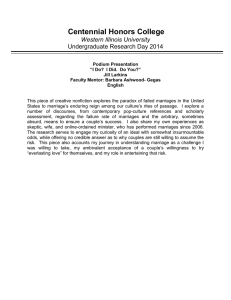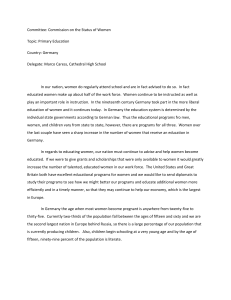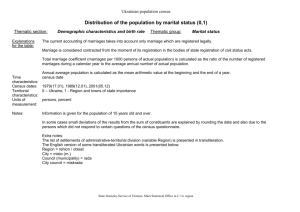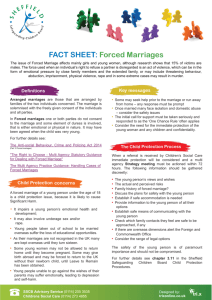Marriage Relationships Chapter 7
advertisement
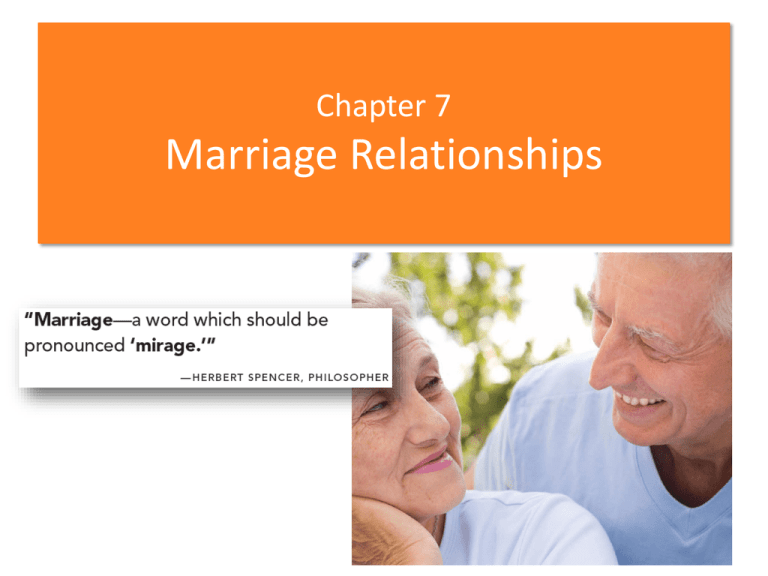
Chapter 7 Marriage Relationships Individual Motivations for Marriage People get married for a variety of reasons. • Love – Is this a mandatory requisite in the U.S? • Personal fulfillment – What the heck? • Companionship – Obviously… think about lonely nights…. • Parenthood – Can’t you raise children alone? • Economic security – Do we do this consciously? Societal Functions of Marriage Important functions of marriage: • Binds couple together who will reproduce • Provides physical care for dependent young • Socializes children into society • Regulates sexual behavior • Provides companionship Marriage as Commitment Commitment: the intent to maintain a relationship • Marriage is a person-to-person commitment. • Marriage is a family-to-family commitment. • Marriage is a couple-to-state commitment. Social policy directs marriage, divorce, and child support. Marriage as a Rite of Passage • Rite of passage: an event that marks the transition from one status to another. • Families cooperate to produce the wedding. • Brides often wear traditional artifacts— concrete symbols that reflect a phenomenon). Changes After Marriage • While laws vary by state, partners typically become part owner of the other’s income and assets. • New spouses often develop increased self-confidence and adopt new values and behaviors. • Marriage affects relationships with friends. Changes After Marriage • The couple’s relationship often changes to disenchantment—transition from a state of newness and high expectation to a state of the mundane tempered by reality. • Partners shift their focus from each other to work or children. Changes After Marriage Couples also experience (Pg. 137): • • • • • Loss of freedom More responsibility Less alone time Changes in how money is spent Discovering that one’s mate is different from one’s date • Sexual changes • Power changes Changes After Marriage • Marriage affects relationships with parents. • Only a minority of spouses report that they do not get along with their in-laws. • Time spent with extended family rapidly increases after children are born. Changes After Marriage • Marriage involves the need for spouses to discuss and negotiate how they are going to get and spend money. • Debt tends to strain relationships. Diversity in Marriage May-December marriage: age-discrepant marriage. • Typically the man is older than the woman. • Research finds no difference in reported marital satisfaction between age-discrepant and age-similar marriages. • Such marriages tend to benefit men more than women. Diversity Interracial marriages • About 15% of all marriages in the U.S. are racially mixed. • Interracial partners sometimes experience negative reactions. – Do the self assessment • Interracial marriages are more likely to dissolve. Diversity Interreligious Marriages • Over one third of marriages in the U.S. are interreligious. • The impact of a mixed religious marriage may depend on the devoutness of the spouses. • Those who are religious tend to be more satisfied with their marriages. Diversity Cross-national marriages • Cross-national marriages are becoming more common. • Much of the stress of these marriages is related to society’s intolerance of crossnational marriages. Diversity Military marriages • About 60% of U.S. military personnel are married and/or have children. • Military contract marriage: marriage in which a military person and a civilian participate to get more money and benefits from the government • Military marriages are particularly difficult for women. Diversity Challenges for military marriages: • Traditional gender roles are challenged. • Loss of control over deployment • Infidelity: length of separation increases the chances of infidelity • Frequent moves and separations • Lower marital satisfaction and higher divorce rates • Employment problems Marital Success Characteristics of couples in happy, stable relationships • Personal and emotional commitment • Common interests/positive self-concepts • Good communication/effective use of humor • Religiosity • Trust • Not materialistic Marital Success Characteristics of couples in happy, stable marriages • Positive role models in their parents • Sexual desire • Equitable relationships • Absence of negative attributions • Forgiveness • Health Marital Success • The Healthy Marriage Initiative is a program of the U.S. Department of Health and Human Services. • Research confirmed the positive effects of education and support for marriages and families.
